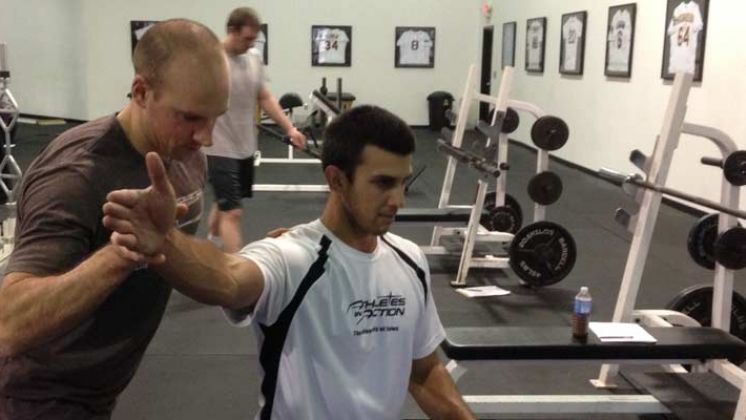Eric Cressey's strength and conditioning tips
One of the world's leading strength and conditioning specialists, Cressey shares his advice for getting the most from your time at the gym

- How critical is hard work to sporting success, as opposed to talent?
- Does anything you see in the gym still surprise you?
- Can I coach bad form out of myself?
- What are your views on dynamic and static stretching?
- Do you ever get your athletes to ever do any cognitive warm-ups prior to a big session or game?
- If I only have enough money to buy one item of gym kit but I want to pack on muscle and torch fat, what should I get?
- What's one nurtured attribute or skill that all your best athletes have?
- What about a natural attribute?
- Is it ever OK to use a strength programme for the masses as opposed to one that's been created specifically for me?
- What are some things I can look out for on a first meeting a coach/trainer to tell if they're any good or not?
- What are some general rules of thumb I should adhere to if I want to be able to keep training hard well into later life?
- What one exercise myth pisses you off the most?
Eric Cressey is the president of a facility located just west of Boston, USA. It's a mecca for American athletes who want to take their game to the next level. A highly sought-after coach for healthy and injured athletes alike, Cressey has helped athletes at all levels – from youth sports to the professional and Olympic ranks – achieve their highest levels of performance in a variety of sports.
How critical is hard work to sporting success, as opposed to talent?
It's tremendously important and especially true at the highest levels. As an example, there's an assumption that all professional athletes are just genetically blessed freaks - and that's what makes them successful. While many of them are obviously gifted in this regard, sports at the highest level can humble athletes quickly if they don't prepare because they're competing against the best of the best and the margin for error is so much smaller. It's not just about being athletic. It's about being able to bounce back with good recovery measures, prepare for game strategy and all those other factors.
Does anything you see in the gym still surprise you?
I'm still fascinated that the cardio area is still generally busier than the weight training area in just about every commercial gym I've encountered. If you have to pick one or the other you should go with weight training 99% of the time because it confers so many more profound benefits. Unfortunately, this isn't reflected in most exercisers' priorities.
Can I coach bad form out of myself?
Sometimes! I think today's era of technology has made it more possible because we can get videos of our training and modify accordingly. Being successful with self-coaching is dependent on being a visual learner, though. Many folks need to be put in a position to really understand what it is and these kinaesthetic learners don't do as well with self-coaching.
What are your views on dynamic and static stretching?
I think they both have a place. I do dynamic flexibility work right after foam rolling and before the training session, then use static stretching work in the post-training period.
Do you ever get your athletes to ever do any cognitive warm-ups prior to a big session or game?
Honestly, I think the best thing most athletes can do to get their minds right before training or competition is to simply shut their cell phones off 30-45mins before they start their warm-up. Too many people are still heavily distracted when they start training.
If I only have enough money to buy one item of gym kit but I want to pack on muscle and torch fat, what should I get?
It's hard to beat a barbell with weights. There's a reason it's been the most popular resistance training implement for almost a century – it works!
Get the Coach Newsletter
Sign up for workout ideas, training advice, reviews of the latest gear and more.
What's one nurtured attribute or skill that all your best athletes have?
Resiliency. The best know that you won't be perfect every time out, so you need to chalk poor performances up as experiences that teach you how to prevent them from happening again. And, they don't allow one bad training session to snowball. They get things right quickly so that the next one will be better. Those who don't have resiliency are often too hard on themselves and get in a downward spiral really quickly. The only way to get better at overcoming adversity is to overcome it.
What about a natural attribute?
Middle of the road joint mobility. All our joints are 'wired' differently. Some people have insanely loose joints (more ligamentous laxity), and others are very stiff. Most of the best athletes I see – particularly who do a lot of throwing movements – are right in the middle, not too tight, not too loose. They benefit from a mixture of mobility and stability work, as opposed to being shifted heavily in one direction.
Is it ever OK to use a strength programme for the masses as opposed to one that's been created specifically for me?
I definitely think so - especially when it's the most cost-effective way for most people to get access to expertise. Of course, it's always better to have something that is specifically designed for one's unique presentation, but that's simply not always feasible.
What are some things I can look out for on a first meeting a coach/trainer to tell if they're any good or not?
I'm a big believer in professionalism. If they're sloppy in the way that they present themselves, there's a good chance that they'll be sloppy in the way that they train their clients. Also, I'd encourage folks to ask where most of their clients originated. If it's referrals and word of mouth, that says a lot about them building a business the right way.
What are some general rules of thumb I should adhere to if I want to be able to keep training hard well into later life?
- Get in plenty of soft tissue work - even if it's just foam rolling.
- Stay on top of your mobility drills.
- Make sure that there is good balance in your programming.
- Make sure you're including periodic de-loads in your programme.
What one exercise myth pisses you off the most?
I think the one that always drives a lot of us bonkers is the idea that it's so easy for women to get bulky with weights. I've been in the industry well over a decade, and have never seen a female get bulky from lifting. They always, however, get leaner as they get stronger. If women feel like they're bulking up, it's because they're not eating right.
Visit ericcressey.com for more information.
Max was the head of digital content for Men's Fitness which worked alongside Coach between 2015 and 2019.

